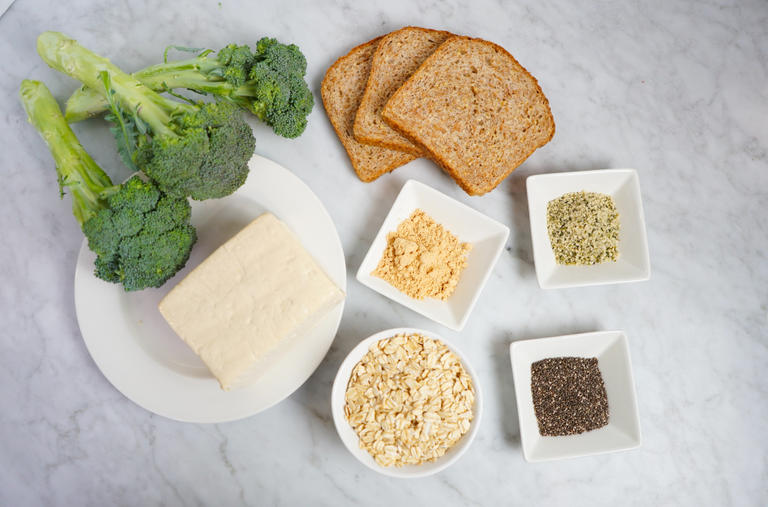10 Best Sources of Plant-Based Protein by Whitney E. RD
Getting protein on a vegan diet is easy. Check out Whitney's ten favorite sources of plant-based protein for inspiration!

Article written by Whitney English RD
When I tell people that I’m predominantly plant-based, their response is usually – so how do you get your protein? It’s a HUGE misconception that plant-based diets are low in protein. Yep, veggies, fruit, grains, nuts, seeds, legumes – they all have protein. Today I’m going to share with you my favorite sources of protein for a plant-based diet.
1. Chia seeds

These tiny little nutritional powerhouses contain about 3.5 grams of protein per two tablespoons. They’re also packed with other important nutrients for plant-based diets like calcium, iron, and zinc.
2. Tofu

Tofu is by far my favorite source of plant-based protein. With about 15 grams of protein per 4 oz serving (cooked), tofu provides approximately one-third of the average woman’s protein needs for the day. It’s also incredibly versatile. Soft tofu can be blended into a smoothie, medium tofu can be incorporated into vegan cheeses, and firm or extra firm tofu can be used for stir-fries and heartier dishes. And it has a mild flavor profile, so you can really use it for any type of dish. It easily takes on the taste of sauces or spices used in cooking. It also has a great texture for those new to plant-based eating and is easily subbed for meat in many meals. I like House Foods tofu as all of their soybeans are non-GMO and grown in the U.S. And despite what you may have heard, soy foods like tofu have tons of nutritional benefits. Studies show that soy may help prevent chronic diseases like cancer, heart disease, and diabetes. It’s also perfectly safe for kids. Research shows no difference in reproductive or endocrine functioning in adults who consumed soy infant formula as infants. In fact, it’s likely that the earlier you begin consuming soy products, the better. Studies show that women who consume soy in early childhood have an even greater reduced risk of breast cancer compared to those who begin consumption later in life.
3. Sprouted Whole Grain Bread

Whole grain bread has about 6 grams of protein per slice. That means one sandwich is packing about a fourth of your daily needs before we even get to the filling! Whole grains are also an excellent source of fiber, which helps to maintain a healthy digestive system and prevent chronic diseases like cancer and cardiovascular disease.
4. Quinoa

Quinoa is what some people would call a “complete protein”. All whole plant foods contain all 9 essential amino acids, some just have lower amounts than others. Still, quinoa, like tofu, has a large amount of all of the essential amino acids and 8 grams of protein per cup, making it a really great plant-based protein option.
5. Hemp Seeds

Hemp seeds got about 6 1/2 grams of protein per two tablespoons and are so easy to toss into salads, smoothies, and bowls to add a punch of plant-based protein.
6. Peanut Butter Powder

While peanut butter is a great source of healthy fat, peanut butter powder gives you more protein per calorie so it’s a great way to boost the plant protein content of meals.
7. Oats

Like bread, most people think only of carbohydrates when they think of oats. But whole rolled oats pack about 11 grams of protein per cup.
8. Nutritional Yeast

These nutty yellow flakes are a plant-based eater essential. Two tablespoons contain about 8 grams of protein, an ample dose of iron, and a plethora of B vitamins.
9. Broccoli

I like to say this vegetable is cruci-ferocious. That’s because one cup of cooked broccoli has almost 4 grams of protein. That’s quite a bit for a veggie. In fact, calorie for calorie, broccoli actually has more protein than some types of beef. While you’d have to eat a ton of broccoli to equal the amount in a steak, I think most plant-based eaters would be up for that challenge.
10. Lentils

While all beans pack a ton of plant protein, lentils top the list with about 18 grams of protein per cup. Just remember to get BPA-free cans.

